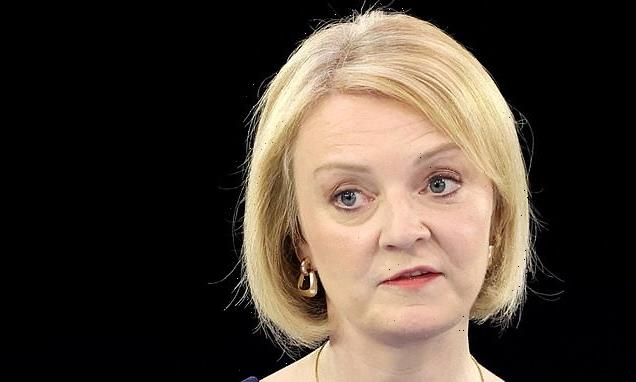Imagine if a pint set you back £25: Power bosses say that would be price if drinks had gone up at the rate of energy… as one bank warns of 18% inflation
- Higher energy bills are fuelling the biggest cost-of-living crisis since the 1950s
- It comes as the price cap is expected to rise to £4,649.72 in January 2023
- Energy bosses have called for the £1,700 increase in annual bills to be scrapped
- It’s claimed that if the price of beer rose at the same rate, a pint would cost £25
Energy bosses have called for the £1,700 increase in annual bills to be scrapped – amid warnings that inflation will hit a staggering 18 per cent.
Industry leaders also called for bailouts as they claimed that if the price of beer had risen at the same rate as wholesale gas, a pint would cost £25.
Soaring inflation is being driven by the fact that household energy costs are set to rise from £15billion in a normal year to £75billion, said Octopus Energy.
And bosses have now claimed that the scale of the crisis is so enormous that it requires the sort of emergency response that was seen during the pandemic with a massive bailout for struggling families. The warnings piled pressure on Tory leadership rivals Liz Truss and Rishi Sunak to pledge more action to tackle the cost of living.
Industry bosses claim that if the price of beer had risen at the same rate as wholesale gas, a pint would cost £25
Mr Sunak sought to exploit the row yesterday, saying Miss Truss would not be able to respond to the crisis at the scale needed if she presses ahead with promised tax cuts.
On Friday, the industry regulator Ofgem is expected to announce that the energy tariff cap will surge, meaning typical annual bills would jump from just under £2,000 to around £3,700 from October 1, with more pain to come in the New Year.
Charities say this would leave millions of households unable to stay warm, keep the lights on and put food on the table.
Higher energy bills are fuelling the biggest cost of living squeeze since the 1950s and analysis from one leading American bank suggested the general rate of inflation could hit an astonishing 18.6 per cent peak. The grim prediction was partly driven by the fact that the value of the pound has fallen against the background of warnings about a recession and strikes, which means imports of oil, gas, food and other commodities are more expensive.
Analysts at investment firm Citi have forecast that inflation will jump to 14.8 per cent in October as energy bills spike, followed by a rise to 18.6 per cent in January as the cost of gas and electricity jumps again.
Citi is predicting that the cap will rise to £3,717 from October 1, before jumping to £4,567 in January and, potentially, as high as £5,816 in April.
The warning came as:
- Downing Street urged families not to ‘panic’ about the energy crisis, saying that the lights would stay on this winter;
- European gas prices surged to record levels amid concern that Vladimir Putin will exploit the crisis by limiting Russian supplies;
- The first shipment of liquid natural gas from Australia to Europe for six years was due to arrive in the UK;
- A former Government energy chief warned there was a one in ten chance of blackouts this winter if calm conditions cut supplies from wind turbines;
- Mr Sunak’s campaign was branded ‘desperate’ after an ally of the former Chancellor claimed that Miss Truss’s reluctance to agree financial assistance would leave families ‘on the streets’.
Miss Truss’s economic plan has so far focused largely on tax cuts designed to boost people’s incomes and kick-start growth.
But the recent surge in gas prices has put her under pressure to offer more direct help to families and businesses struggling to pay their energy bills. At the weekend she said that while she would not ‘reach first for the handout’ she was now prepared to look at the problem ‘across the board’.
Kwasi Kwarteng, who is tipped as her likely Chancellor, told the Mail on Sunday that ‘help is coming’.
A Government source last night said the scale of the crisis would leave Miss Truss no choice but to go further. ‘Things have got a lot worse in the last two weeks,’ the source said. ‘It is very hard to see how she can say nothing if the price hike this week is as bad as everyone now fears.’
As Chancellor, Mr Sunak unveiled a £15billion support package on the basis of predictions that the price cap would jump to £2,800 in October. But analysts now believe it will surge to around £3,700.
The surge in energy prices is also set to send wider inflation spiralling to levels not seen since the 1970s.
Investment experts Hargreaves Lansdown said food inflation on many essentials is already over 18 per cent. Personal finance expert at the firm, Sarah Coles, said: ‘Inflation at 18.6 per cent would push millions of people into dire straits. And because these horrible price hikes are being driven by the essentials people need to stay alive – like food and heat – it’s going to hit those on lower incomes hardest, who’ve got nothing left to give.
‘A winter of woe is looming amid these frightening forecasts and there is little help in sight.’
Energy industry bosses yesterday said the Government should step in and effectively take on the immediate burden of the increase in energy costs.
In the short term, the Treasury would stump up £40billion to cover higher wholesale gas and electricity prices, which are a direct result of Russia’s invasion of Ukraine and resulting sanctions.
This money would then be clawed back from customers through a future levy on bills, which would be spread out over ten years or more.
Greg Jackson, of Octopus Energy, which has some 3.2million customers, told the BBC: ‘We need more help for customers from the Government. The reality is that customers are being asked to pay the price of gas, which has been weaponised by Putin.
‘To put it into perspective, the UK’s energy bill is going from maybe £15billion in a normal year to £75billion this year. That’s the equivalent to nine pence or more on the basic rate of income tax. No government would announce that and, in the same way, no government should let this happen to customers.’
He said consumers should understand that gas prices are up to 11 times higher than usual and this was equivalent to a pint of beer costing £25. Asked about what should be done, he said: ‘Many of the energy companies now favour a tariff deficit fund. Essentially you freeze the price cap roughly where it is when prices are high and fund that by paying it back when prices are coming down.
‘That would see prices staying where they are now, which is still two-thirds above where they were a year ago, and they would then drift back down to maybe £1,000 a year over the next decade.’ Mr Jackson said energy retailers, such as Octopus, are not making profits, rather it is producers who source gas and electricity, such as BP, Shell and Centrica, that are benefiting from the surge in wholesale prices.
Dale Vince, founder of Ecotricity, backed this idea, saying ministers need to cancel the October price rise. ‘The Government needs to step in and pick up this cost like they did during the pandemic. We need £40billion to get through this winter, that’s 10 per cent of what was spent during the pandemic, and that is the only thing that will sort this out,’ he said.
A Government spokesman it has already introduced a £37billion package to help households, including £1,200 each for eight million of the most vulnerable families.
Source: Read Full Article


